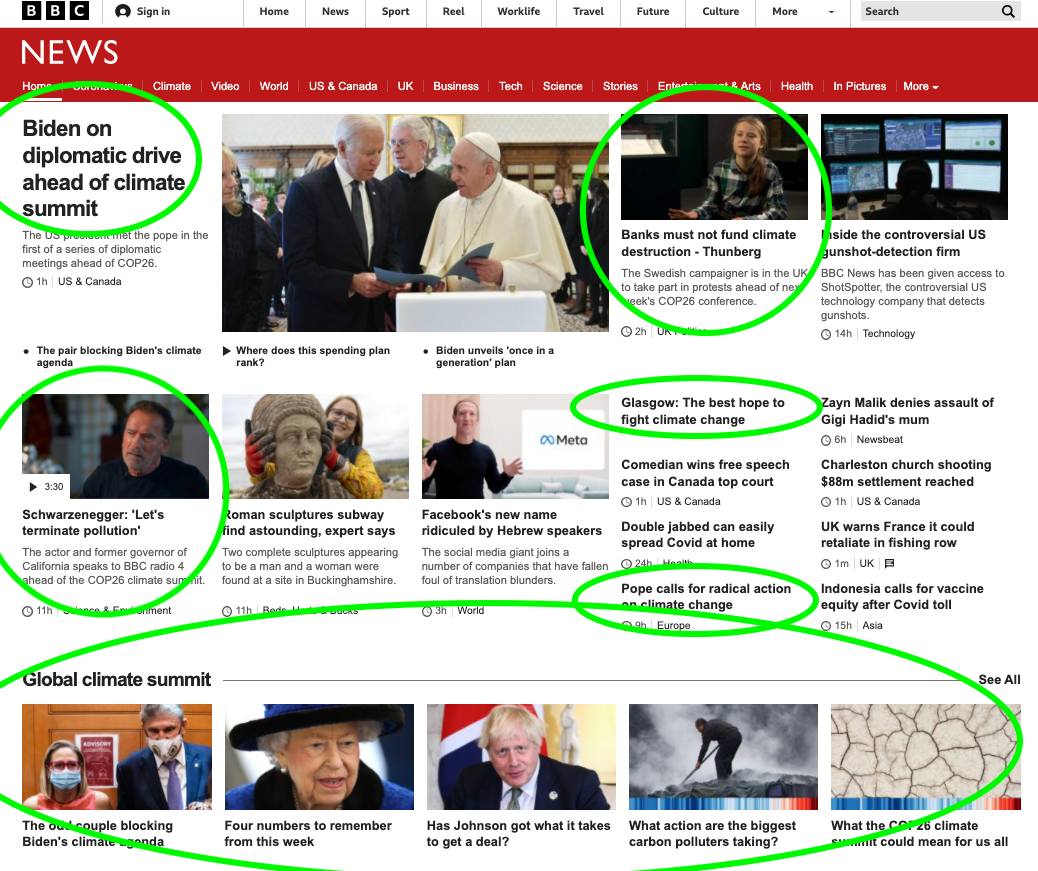Just last week, the BBC unveiled a 10-point plan to address concerns that its reporting is too often biased.
Funded by a $215 “license fee” that is paid by most Britons who own TV transmission devices, the BBC is a public broadcaster. The BBC’s responsibility for fair and accurate reporting is embedded into its charter. Unfortunately, BBC News appears to have lost the charter and last week’s memo.
Last week, in preparation for the Glasgow COP26 climate change summit that began on Monday in Scotland, the BBC News website was chock-full of climate change stories. As my screenshot shows, top billing was even given to opinion statements by Greta Thunberg and Arnold Schwarzenegger.

But now that COP26 is underway, BBC News’s carbon cuts advocacy has gone into overdrive.
First, a caveat.
The problem, here, is not that the BBC is covering this summit. The summit is being held in Britain, and the vast majority of climate scientists believe that man-made carbon emissions are central to destabilizing climate change. For what it’s worth, I share that assessment. It’s appropriate that Britain’s public broadcaster devote significant resources to COP26.
The problem, however, is that BBC News’s leadership appears to believe that reporting must come second to advocating for dramatic carbon emission cuts.
BBC News’s website live feed of COP26 encapsulates this dynamic. It’s laden with editorializing. This includes an interview with a psychologist offering guidance for readers who may find the stakes of the summit too stressful. Another headline celebrated a “moving” speech by an Amazonian native. Aside from the BBC’s Beijing correspondent, who crystallized China’s competing priorities on climate change, the website is currently a guide to advocacy 101.
The lack of objectivity goes further.
Take BBC News’s science editor, who on Sunday offered hope that the summit “could be a ‘tipping point where big investors start to shift their trillions of dollars out of fossil fuels — a few days ago Europe’s largest pension fund announced it would do just that.”
Perhaps this investment shift would be good. Perhaps it is even necessary. But basic journalistic fairness would suggest that the BBC include a reference to the fact that such a shift is not without risk. After all, if a pension fund sees declining returns on investment by shifting its investments away from fossil fuels, pensioners will be the ones to suffer. The least wealthy the most. That cuts to a broader issue that climate change activists are reluctant to address: the inequitable impact of carbon price hikes on the poorest in our societies.
On that point, take the BBC News report, on Monday, on a prospective new mine in England. The report noted disdainfully that the company behind the mine says it “will create 500 jobs, but skeptics think that’s exaggerated.” The BBC notes a letter of support for the mine by Conservative parliamentarians, but the job-creating skeptics and their rationale are left unidentified.
Or take the BBC’s North America editor Jon Sopel. In April, Sopel wrote a de facto love letter to Joe Biden. But on Monday, he lamented the president’s failure to pass his climate agenda. Sopel criticized U.S. road users who are angry over rising gas prices. He noted that “drivers are up in arms that they’re having to pay over $3 a gallon. Perhaps Biden should organize for them to visit a few British petrol stations to make Americans thank their lucky stars.” (Gas prices in the United Kingdom are more than twice that of U.S. prices).
BBC News has some of the best journalists in the world. But they should stick to reporting, not opinion. Especially if, as they obviously do, they want to educate readers on critical challenges.
